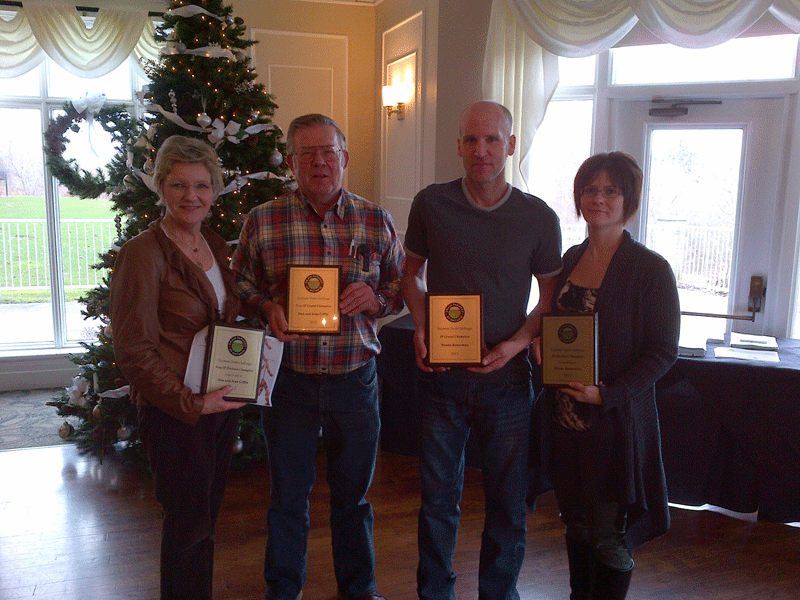Out-yielding the competition
SOYBEAN YIELD CHALLENGE WINNERS
growers that were outstanding in their field were honoured in the 2012 Yield Challenge created and hosted by Grain Farmers of Ontario. Last month we profiled the Spring and Winter Wheat Yield Challenge winners; in this edition of Ontario Grain Farmer we feature the winners in the Soybean Yield Challenge.

The Soybean Yield Challenge had divisions for IP and non-IP. In each division, the top two placements were awarded for each of three relative maturity zones. The IP and non-IP winner in each zone received a cash prize valued at $10 x bushels per acre. The winner and runner-up in each zone received admission to Canada’s Outdoor Farm Show and a local farm show. Ultimately, the top IP and non-IP winner were awarded a trip to the National Farm Machinery Show in Louisville, Kentucky.
IP soybeans
A focused effort to build up soil nutrients combined with a solid seed selection and rains that came just in time helped Raube Beuerman clinch the grand prize spot in this year’s Soybean Yield Challenge IP division with a 77.93 bushel per acre yield. The results were unexpected for Beuerman.
“It was a huge surprise at the awards banquet,” said Beuerman. “I had a hunch I might win my maturity zone, but didn’t realize the yield would be the overall division winner too.”
Beuerman crops 45 workable acres in Dublin, Ontario using a corn, soybean and winter wheat rotation. He’s also a partner alongside his parents in Streamlined Finishing Ltd., a contract swine-finishing barn. When not farming, he operates a near full-time business, Beuerman Recreational Services, doing mechanic work on motorcycles, all-terrain vehicles and snowmobiles.
When a friend recommended OAC Wallace, Beuerman did some online research and checked the OMAFRA trials and was impressed with what he read. For him, the seed edged out other options. He planted approximately 180,000 seeds per acre onto his field that hadn’t seen soybeans for more than a dozen years.
Beuerman applies 4,000 – 5,000 gallons of hog manure to his fields every three years (before corn) by injecting with a drag hose. He prefers this approach over using a manure tank because it favours minimal soil compaction. Between manure applications, he works at soil maintenance with fertilizer applications, focusing on potash.
A few years ago, Beuerman grid sampled that particular field. “It was really interesting to look at the nutrient levels,” he said. “There was a big difference by elevations and soil.” With his stronger understanding of what each land section needed, he applied phosphate and potash separately before planting the beans. “The low field spots tested high in phosphorus and low in potash, and the high elevations were vice versa so I fertilized accordingly.”
Beuerman likes to tissue test his crops and fertilize accordingly. “I find that just because the nutrients are in the soil doesn’t mean the plant is getting them, or maybe getting too much, so I make adjustments in my fertilizer program.”
Typically, he plants beans no-till, however because of a slug challenge the year previous he opted for conventional tillage. Beuerman got an early jump planting the treated, certified seed soybeans into his tile drained, clay-loam soil with a 15-inch drill. “They were up fast and canopied well,” he said. He applied a starter fertilizer with the soybeans and Optimize was his inoculant of choice. He didn’t foliar feed, noting that for him, feeding the soil has been a better paying proposition.
The field was treated with herbicide pre-planting and twice more after the soybeans had emerged. Without any major spider mite pressure in his crop, Beuerman opted not to use an insecticide. However, he did apply Acapela, for his early bloom fungicide application.
“I’m a big believer in using fungicide on my crops,” said Beuerman. “It may not have as good of returns on soybeans compared with corn and wheat, but I’m convinced it still adds yield and keeps the plants healthier.”
At harvest, the beans were ready, but the plant was still lagging. Beuerman thinks the fungicide may have been an influence. The moisture was on target when combining. All the soybeans were sold through the Hensall Co-op.
As a grand prize winner of the Soybean Yield Challenge, Beuerman is looking forward to attending the farm show in Kentucky. It will be his first time attending. It will also be a chance for him to meet with US consultant Phil Needham of Needham Ag Technologies, who he has consulted with by email in the past. Beuerman is looking forward to picking up on their wheat discussions face-to-face.
non-ip soybeans
It was a banner soybean year for Don and Jean Giffin of Blenheim, Ontario. With a yield of 82.87 bushels per acre they earned the grand prize spot in this year’s Soybean Yield Challenge non- IP division.
“The soybean plants were up to my chin and loaded with pods to the tip,” said Don Giffin. “They were the best looking beans we’ve ever had.”
The Giffins produce corn, soybeans and award-winning maple syrup on more than 400 acres of land at their Willow Creek Farms 05. Giffin said it was a combination of management factors and the growing season that set the scene for their best soybean crop yet.
“We just had everything line up perfect,” he said, noting it was the first time they had ever entered the Yield Challenge contest hosted by Grain Farmers of Ontario.
The Giffins planted the 93Y05 variety from Pioneer Hi-Bred, based on the advice of agronomist Morris Sagriff. Giffin had hoped to grow soybeans in his particular plot of land but was concerned some remaining corn from the year previous would create issues. Sagriff believed the soybeans would thrive, provided the Giffins were able to get them planted by the first week of May.
A wet fall in 2011 kept Giffin from working the land. By spring he made passes to deep disc and cultivate, doing his best to work the combine ruts and corn stalks. Giffin said the acreage had seen cow manure for 80 years, and they paid close attention to the results of their soil tests.
Prior to discing, Giffin applied a pH and liquid manure modifier. He had used the product on his corn the year previous and was really impressed with the results. “It seems to help ensure the elements in the soil are not tied up and are made available to the plant,” he said. “We’ve seen phenomenal yields from using it.”
Giffin opted to use inoculant, saying he considered it to be good insurance and that it’s easy to get and inexpensive. He also applied foliar crop booster fertilizer to the crop giving it a little extra boost, he said.
The growing season went smoothly and had a lot to do with the final yield. Giffin said their land abuts the north shore of Lake Erie that received timely moisture. “We had heat, and not a lot of excessive rain,” he said.
Don and Jean are really looking forward to attending the National Farm Machinery Show in Louisville, Kentucky in 2014. It will be their first time at the show.
THE 2012 SOYBEAN YIELD CHALLENGE WINNERS
Non-IP Division
Zone 00 and 0:
1st Place Keith Reeds, Lindsay, ON 77.75 bu/ac
2nd Place Ronald Rody, Moorefield, ON 67.74 bu/ac
Zone I:
1st Place Justin Dorland, Dorland Farms,
Brighton, ON 74.35 bu/ac
2nd Place Martin Mesman, Winchester, ON
73.15 bu/ac
Zone II and III:
1st Place Don and Jean Giffin, Blenheim, ON
82.87 bu/ac
2nd Place Mark Delanghe, Wallaceburg, ON
80.29 bu/ac
IP Division
Zone 00 and 0:
1st Place Raube Beuerman, Dublin, ON 77.93 bu/ac
2nd Place Don Rickard, Ceresmore Farms Ltd.,
Bowmanville, ON 75.25 bu/ac
Zone I:
1st Place Robert Vanhie, Ailsa Craig, ON 60.08 bu/ac
Zone II and III:
1st Place Ron Verbeek, Muirkirk, Ont. 72.58 bu/ac
2nd Place Jeff Struyf, Thedford, Ont. 68.99 bu/ac
Grand Prize Winners:
Don and Jean Giffin (non-IP) and Raube Beuerman (IP)
The Soybean Yield Challenge is sponsored by DuPont Canada (IP division) and Monsanto (Non-IP division).
Additional support is provided by Gold sponsors: Hyland Seeds, DuPont Pioneer, Maizex Seeds Inc., DEKALB brand, Mycogen Seeds, Syngenta NK, Becker Underwood, and Country Farm Seeds Ltd.; and by Silver sponsor: Secan. •








